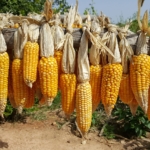


Statistics for Sustainable Development
Ecuador Bolivia Peru, Burkina Faso Niger Mali, Kenya, Uganda, Malawi, and Tanzania
12/2019—12/2022
The Research Methods Support (RMS) team has worked with CCRP since 2009. The RMS project is a flagship crosscutting project, supporting the CCRP at project, regional, and program levels. During the early years of the RMS project, the team was based at Reading University in the UK. In 2016, the team formed an independent social enterprise company named Statistics for Sustainable Development (Stats4SD). In 2018, Stats4SD oversaw a capable team of 17 staff with expertise in research design, digital technologies, and data analysis and use across social and biophysical sciences, and with outstanding experience in participatory research. They engage actively with other CCRP grantees as individuals and teams, both in-person and virtually. In addition to providing support for the full research cycle (farmer/stakeholder engagement, study design, data gathering [e.g., app development], data management, analysis, interpretation, and publication), they actively engage as members of the CCRP leadership team and in relevant global dialogues. Stats4SD’s support work with regional CCRP grantees takes place through face-to-face data clinics and RMS workshops as well as webinars and web content development.
The CCRP’s goals, principles, and theory of change are audacious, aiming to bring change that benefits smallholder farmers who are farming in some of the most remote and challenging environments in the world. CCRP-funded researchers, farmers, and NGO workers in the “hunger hotspots” of Africa and the Andes also face serious challenges and require support to strengthen their research capacities. Providing this support is the CCRP’s central aim. The RMS project delivers a key part of this support in the form of help for sound and innovative research throughout the cycle from ideation, through study design, to analysis, communication, and application of the findings. Because the CCRP’s approach involves engagement with farmers and other stakeholders throughout the process, the methods used for research are special and not typically taught as part of researchers’ formal or informal training. The CCRP aims to support transformative processes that put agriculture on a more regenerative, productive, and equitable footing based on the application of agroecological principles, which also requires new and atypical thinking, strategies, and approaches.
For more than a decade, the RMS team has both participated in the work of all CCRP communities of practice (CoPs) as part of the regional teams, and as part of the CCRP leadership team. The thinking and work of the RMS has been an essential ingredient to the innovative spirit of the program. The proposed renewal project will allow the team to continue to work with individual grantees, project teams, CoPs, and the leadership team to advance our individual and collective effectiveness.
Intended outputs:
Intended outcomes:
